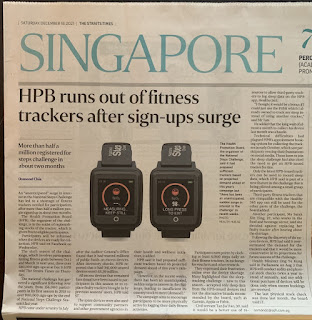Well, at least they are out getting some 'exercise' while buying presents for their loved ones. Are you wondering how to motivate someone to exercise? Well, this week's post does exactly that. And yes, rewards are very important to get people to exercise.
Just like the proverbial dangling of the carrot in front of the donkey, evidence suggests that monetary rewards plays a big role in motivating one to exercise.
This mega study involved 61,293 gym members from the American 24 hour Fitness chain, 30 scientists from 15 universities and more than 50 motivational programs.
Incentives include a free audiobook for gym use, cheery instructions from instructors to reframe exercise as fun and reward points under an umbrella program called Step Up. After signing up, these gym members earned Amazon reward points worth US$1 (S$1.36) and new ways to motivate themselves to exercise.
The scientists divided these participants into 53 different groups. Each group had at least 455 participants. In an example group, members earned US$1.75 reward points each time they visited the gym. Other groups shared workouts on social media, signed fitness pledges etc. Each intervention lasted a month. Of course there was a separate control group that changed nothing about their daily lives or gym time.
Here are the results. The most successful intervention was giving people US$0.09! Yes, 9 cents worth of reward points if they returned to the gym after missing a planned workout. This increased visit rates by 16 percent compared to just planning in advance and text reminders. Giving participants US$1.75 everytime they worked out was almost as effective, it increased exercise participation by 14 percent.
So as we approach the coming new year with new fitness resolutions, other than planning a reasonable workout schedule, putting the program reminders into our phones or having a spouse/ training buddy, the above findings suggest finding a small way to reward ourselves when we do exercise, works best. Perhaps the shoppers in the above picture were also thinking of buying themselves a present after dealing with Covid-19 for almost 2 years now.
Ministry of Health officials reading this, can we reward participants with some monetary incentive from NTUC with every hour walked or a workout done? That may help with our growing diabetes problem too.What about you? Would a monetary incentive motivate you to workout more regularly? How much would it take before you proceed? Appreciate your comments please.
Reference
Milkman KL, Gromet D, Ho H et al (2021). Megastudies Improve The Impact Of Applied Behavioural Science. Nature. 600: 478-483. DOI: 10.1038/s41586-021-04124-4






I agree with the article and believe that money is a good incentive. It helps break the laziness cycle of individuals like me who want to exercise but are often too lazy or it may not be at the top of the priority list. But im curious to find out if money can motivate those who dont want to, or even hate exercising to exercise haha
ReplyDeleteFor me, I feel that monetary incentive doesn’t really motivate me that much or maybe the incentive is not ideal enough for me.
ReplyDeleteBut what worked very well for me to start exercising was the act of spending money. I got a gym membership a few months back and as I’m spending about $100 a month for the membership. I feel that the pressure of not wasting the money I spent, encourages or more like forces me to exercise. I guess how I see it, is that if I don’t go to the gym. I’m getting punished by losing the money spent.
Well on the other hand, for a monetary rewards, I don’t have it to begin with, so I don’t lose anything.
I agree that monetary incentives will be effective in motivating the sedentary population, including the elderly, to work out more regularly. It would be more effective if these incentives were given in cash or credit transferred into bank accounts, compared to e-vouchers at local supermarkets or FnB retailers for eg. At least that's what my grandmother would like.
ReplyDelete